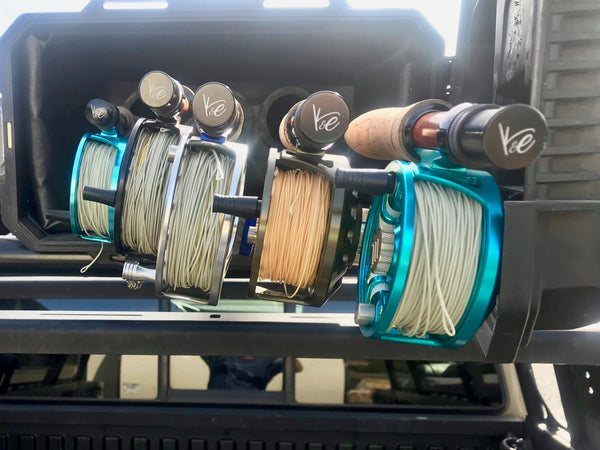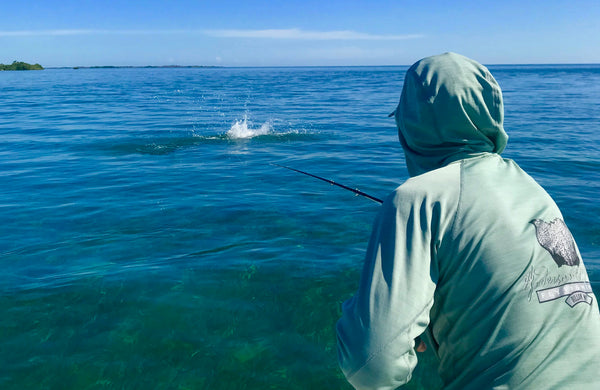6 Ways to Survive the Fly Fishing Off-Season

Winter. For most of us in North America this defines the dreaded off season for fly fishing. For some this hellish part of the year represents a complete shutdown of all fly angling possibilities. For others it simply narrows the opportunities to only a few pieces of water and only on a handful of days where the weather and the water cooperate. For a few lucky ones in the Southern U.S. wetting a line may barely slow down. But for the vast majority of us, there is a well defined and sometimes lengthy off season. No matter what, it affects us all to some degree or another and can result in a rather uncomfortable illness called "Lackus fishius" also commonly known as "Cabin Fever". The symptoms very in severity. The early symptoms include long vacant stares out of a window and a significant increase in Youtube fly fishing video watching. The more severe symptoms include seizure-like acitivity that when observed closely resemble the movements of casting and stripping. Not good people. Not good at all.
Here it is, early March in Central Washington, and as I look out the window at the 24" of snow covering the ground, the cabin fever bumps up a notch and I know that I am not alone. It's a common malady but fortunately not one that is without a form of remedy. Anglers more experienced than I with more winters under their belts have taught me over the years some tried and true elixirs to combat the winter fly fishing dulldrums. Here are 6 things that just about anyone can do to keep the fly angling spirit alive and well during the short days of winter.

1. Trip Planning:
One of my favorite fly fishing "off season" activities (and a surefire cure for cabin fever) is planning trips for the upcoming fly fishing season.

2. Organize your fly collection:
Even though you may try to keep on this as the angling season goes on. Most of us realize that we need a good restock at the end of the year. Spend some winter hours getting this done. It's fun to build your fly inventory and you may even discover some new patterns that you haven't used before. Surf the Internet a little and watch a few videos on fly tying. It can be very inspirational. Make a comprehensive list of what you have and what you need. Then set about acquiring the flies that you need to fill the holes in your collection.
For some of us, this means pulling out the credit card and placing a big order. For others it means spending time at the fly tying vice. For others it is a combination of the two. No matter how you go about this. You will guarantee that you are all set to go for the next year.

3. Tie your own flies:
Many of us already make a habit out of this but it seems that many fly anglers don't spend time at the fly tying vice. If you are not currently tying flies, give it a chance. Tying your own fly fishing flies is really rewarding and adds a whole new level of fly fishing satisfaction and sense of accomplishment. Some would say that the pinnacle of a fly fisherman's career is when they start hooking fish with flies that they themselves tied. But it is much more than that. It offers a side hobby to the sport of fly fishing. It is relaxing to sit and and focus your attention on one fly at a time. It offers the ability to personalize and alter fly patterns in a way that might work better for you on your home water than the original. It allows for some daydreaming of the upcoming season and can lead to some trip planning as well.
If you are just starting into fly tying, don't plan on filling your fly boxes with perfectly tied patterns. Set reasonable expectations and focus on mastering some simple but important patterns first. Then, winter after winter, you may find yourself spending very little money on flies tied by someone else.
Fly Tying get-togethers with your fly fishing friends are also a ton of fun and get you and your fellow anglers together off the water too.

4. Gear maintenance:
Long hours indoors is a prime opportunity to comb through your fly gear. After a hectic year of squeezing in every minute of fly fishing time you can, chances are the gear is in a bit of disaray. Take some time to really go through it. Be thorough. Here is a list of what you might want to do:
- Clean and inspect your rods. Pay special attention to the guide epoxy and repair any cracks or chips. Clean the cork and reel seat threads. Wipe down the rod with a gentle cleaner or just soap and water.
- Clean the fly line. Unspool the line and inspect every inch for cuts. Clean it with line cleaner or soap and water. Check your backing knot and re-spool.
- Clean your reels. Remove all the parts that you can (comfortably) and carefully clean out any grit or debris. It will simply run smoother for you if you do this.
- Clean and dry you packs or vests. Usually you can get away with a cold water gentle cycle in the washing machine and allow to air dry. Repair any seams that are coming undone.
- Clean your wading boots and waders. Now is an excellent time to evaluate the soles on your boots. If they are worn or delaminating, get new ones put on and you will be ready to go come Spring.
- Check your fly boxes. Clasps and hinges have a shelf life. If yours are weak and not working well, purchase some new ones. They aren't all that expensive theres days and you don't want to risk loosing your flies next season.

5. Stay Fit:
Don't panic! I'm not talking about becoming a gym rat (unless you are into that kind of thing, in which case, more power to ya). But lets face it. Winter can result in a few extra pounds and some soft body parts. Fly Fishing may not be the most athletic of activities but it does require a certain amount of strength, endurance, and balance. If you work to keep up on some basic physical conditioning in the off-season, you will be ready to go come Spring. Try these ideas:
- Take the dog snowshoeing or on regular hikes.
- Do some floor stretching and exercises. Squats, lunges, and jumping rope are good for keeping your wading legs in shape.
- Yoga. (Check our article on "How Yoga can make you a better fly Angler")
- Casting Practice. Get out in the snow and cold and practice casting. Maybe even set up a mini fly casting course in your yard or nearby park. Off-season is a good time to hone your bug slinging skills.

6. Start a Fly fishing Journal:
This is a really fun way to start thinking about the upcoming fly fishing year and can help toward idea #1, "Trip Planning". There are some really nice fishing journals being produced these days. including some that are leather bound. The pages contain pre-printed sections that help to organize your thoughts and experiences on any given fishing day. During the winter is a good time to spend locating one of these or possibly simply creating your own. It doesn't have to be fancy. Even a simple notebook will do, but I do recommend that you format the pages in advance to help keep the entries organized and consistent. This will then help the journal function as a quick reference for later when you are trying to remember just how or when you caught the nice fish years from now. Here is a link to a pretty nice ready-to-go journal: Rustico Fishing Log
There are even apps now for your phone that can help you document days on the water and attach photos of the day. One of the better apps is Fishidy. You can check them out here.
Bonus idea:
Read. If knowledge is power then those of us with long winters should be pretty powerful. There are too many good fly fishing reads to list (maybe we will attempt to tackle this in another post in the future). You can easily find books on "How to fly fish" if you are new; "Techniques to expand your fly fishing" if you are experienced; "Fly Tying" if you spend time at the vice; "Fly Fishing Travel & Adventure" if you like to dream; and "Fly Fishing Fiction" if you just want to be entertained. Simply search for these topics in Amazon Books or on Google and you may be shocked at just how much literature there is out there on Fly Fishing.
I have found that expanding my library directly correlates to my confidence and ability in fly fishing. Youtube videos can be great, but reading delivers a more thorough education in my humble opinion.
No matter how cold or how long your winter fly fishing off season is, hopefully these 6 ideas will help you stay involved and interested in your fly fishing journey. "Down time" doesn't have to mean flat on your back on the couch. The 7 ways to survive the fly fishing off season listed above are all just as important to fly fishing as actually casting to fish on your favorite stream.
SEE YOU ON THE WATER!
Also in News

Unlocking the Secrets of Fly Rod Weights: A Comprehensive Guide
Fly Fishing Tapered Leader Size Chart
| 2X | 10.0 lb |
| 3X | 8.2 lb |
| 4X | 6.4 lb |
| 5X | 5.0 lb |
| 6X | 3.4 lb |


